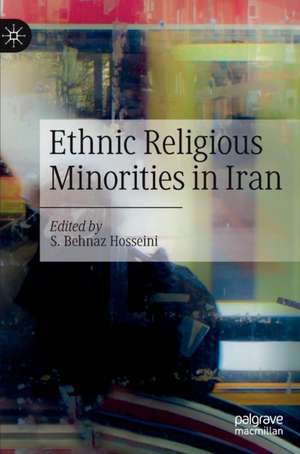Ethnic Religious Minorities in Iran
Editat de S. Behnaz Hosseinien Limba Engleză Hardback – 25 ian 2023
This book explores the experiences of the ethnic and religious minorities of Iran, such as Jews, Yarsani, Christian, Sabean Mandaean, Bahai, Zoroastrian, Baluch, Kurd, and others and provides a historical overview of their position in society before and after the 1979 Islamic revolution and highlights their contribution to the country's history, diversity, and development. It also focuses on the historical, sociopolitical, and economic factors that affected the minorities' development during the last century. Author Behnaz Hosseini has shaped this book with authentic material and has assembled the experiences and opinions of academics of diverse backgrounds who approach the minorities’ issues in Iran in a constructive and ingenious way: from debating their efforts to preserve their identity and cultural heritage and ensure their survival to discussing their relations with the majority and other minorities, the role of religion in everyday life, and their contribution to the rich cultural history of Iran.
| Toate formatele și edițiile | Preț | Express |
|---|---|---|
| Paperback (1) | 888.31 lei 6-8 săpt. | |
| Springer Nature Singapore – 25 ian 2024 | 888.31 lei 6-8 săpt. | |
| Hardback (1) | 893.53 lei 6-8 săpt. | |
| Springer Nature Singapore – 25 ian 2023 | 893.53 lei 6-8 săpt. |
Preț: 893.53 lei
Preț vechi: 1089.67 lei
-18% Nou
Puncte Express: 1340
Preț estimativ în valută:
170.100€ • 176.65$ • 142.31£
170.100€ • 176.65$ • 142.31£
Carte tipărită la comandă
Livrare economică 25 martie-08 aprilie
Preluare comenzi: 021 569.72.76
Specificații
ISBN-13: 9789811916328
ISBN-10: 9811916322
Pagini: 276
Ilustrații: XXX, 276 p.
Dimensiuni: 148 x 210 x 23 mm
Greutate: 0.52 kg
Ediția:1st ed. 2023
Editura: Springer Nature Singapore
Colecția Palgrave Macmillan
Locul publicării:Singapore, Singapore
ISBN-10: 9811916322
Pagini: 276
Ilustrații: XXX, 276 p.
Dimensiuni: 148 x 210 x 23 mm
Greutate: 0.52 kg
Ediția:1st ed. 2023
Editura: Springer Nature Singapore
Colecția Palgrave Macmillan
Locul publicării:Singapore, Singapore
Cuprins
Chapter 1. Religious and Ethnic Minorities in Iran: An Introduction.- Chapter 2. Iranian Constitution Under Pro-Center Dogmatic Authoritarianism and Pro-Persian Cosmopolitanism, and Its Impacts on Ethno-sectarian and Ethno-linguistic Minorities.- Chapter 3. Sectarianism and National Cohesion Sunni Political Activism in Iran.- Chapter 4. The Role of Asheqs in Maintaining and Promoting the Culture of Khorasan’s Kurds.- Chapter 5. Porkhani and Ishani: Women Healers in the Turkmen Community in Iran.- Chapter 6. Iranian Jews’ Tendency to Religious Visibility and Adapted Coexistence.- Chapter 7. Demographic Aspects of Iranian Immigrants’ Integration in Israel.- Chapter 8. An Islamized Mandaeism: Examining the Impacts of Shia Muslims on the Religionism of the Iranian Mandaeans.- Chapter 9. The Contemporary Collective Identity of Zoroastrians in Tehran: Between the Strategies of Dichotomization and Complementarization.- Chapter 10. Sociological Analysis of Social Trust in the Zoroastrian Community in Tehran.- Chapter 11. Transformation and Appropriation of Religion: A Case of Yārsāni Community in Iran./
Notă biografică
S. Behnaz Hosseini is a visiting research fellow at Centre for Studies in Religion & Society, University of Victoria in Canada as well as minority researcher, project coordinator, and conference organizer at the mobilecultures team affiliated with University of Vienna. She is an Honorary Fellow in the Center for Research on Gender and Women at the University of Wisconsin College. She is also a Middle East media analyst with Persian media. Dr. Hosseini has conducted extensive research on minorities in the Middle East and has worked with the United Nations as an expert consultant on ISIS crimes against religious minorities in Iraq.
Textul de pe ultima copertă
"This collected volume is an attempt to create an overview of Iran’s main religious and ethno-religious minorities in their relationship to the dominant political discourse. The diversity of the topics, the international and academic backgrounds of the authors as well as their contemporary orientation distinguishes this volume as an original one." —Behrouz Alikhani, Senior Lecturer, WWU Münster, Institute of Sociology, Germany.
This book explores the experiences of the ethnic and religious minorities of Iran, such as Jews, Yarsani, Christian, Sabean Mandaean, Bahai, Zoroastrian, Baluch, Kurd, and others and provides a historical overview of their position in society before and after the 1979 Islamic revolution and highlights their contribution to the country's history, diversity, and development. It also focuses on the historical, sociopolitical, and economic factors that affected the minorities' development during the last century. AuthorBehnaz Hosseini has shaped this book with authentic material and has assembled the experiences and opinions of academics of diverse backgrounds who approach the minorities’ issues in Iran in a constructive and ingenious way: from debating their efforts to preserve their identity and cultural heritage and ensure their survival to discussing their relations with the majority and other minorities, the role of religion in everyday life, and their contribution to the rich cultural history of Iran.
S. Behnaz Hosseini is a visiting research fellow at Centre for Studies in Religion & Society, University of Victoria in Canada as well as minority researcher, project coordinator, and conference organizer at the mobilecultures team affiliated with University of Vienna. She is an Honorary Fellow in the Center for Research on Gender and Women at the University of Wisconsin College. She is also a Middle East media analyst with Persian media. Dr. Hosseini has conductedextensive research on minorities in the Middle East and has worked with the United Nations as an expert consultant on ISIS crimes against religious minorities in Iraq.
Caracteristici
Provides insights into minorities religious beliefs and their situation in Iran Explores strategies devised to avoid persecution and maintain distinctive cultural and religious beliefs Offers an inter-disciplinary approach to the culture and religious beliefs of the people
